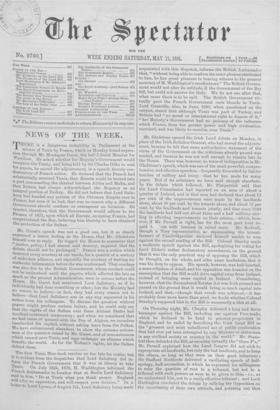Mr. Gladstone opened the Irish Land debate on Monday, in
place of the Irish Solicitor-General, who had moved the adjourn- ment, because he felt that some authoritative statement of the views of the Government on the criticisms already passed was needed, and because he was not well enough to remain late in the House. There was, however, no trace of indisposition in Mr. Gladstone's speech, which was one of the most powerful, compre- hensive, and effective speechos,—frequently diversified by lighter touches of raillery and irony,--that he has made for many years. But of its substance we have said enough elsewhere. In the debate which followed, Mr. Fitzpatrick said that the Land Commission had reported on an area of about a quarter of Ireland, and in that area had declared that about 12 per cent. of the improvements were made by the landlords alone, about 36 per cent. by the tenants alone, and about 52 per cent. by the landlords and tenants jointly, and that since 1840 the landlords had laid out about three and a half millions ster- ling in effecting improvements on their estates,—which, how- ever, if Mr. Parnell is right, has for the most part been re- . paid t, '-em with interest in raised rents. Mr. Rodwell, though a Tory representative, as representing the tenant- farmers of Cambridgeshire declared himself unable to vote against the second reading of the Bill. Colonel Stanley made a moderate speech against the Bill, apologising for voting for Lord Elcho's rather declamatory amendment, on the ground that it was the only practical way of opposing the Bill, which he thought, on the whole, and after some hesitation, that it was his duty to oppose. His speech, however, was half-hearted, a mere criticism of detail, and his opposition was founded on the assumption that the Bill would drive capital away from Ireland, instead of bringing more capital to Ireland. Considering, however, that the Encumbered Estates Act was both pressed and passed on the ground that it would bring so much capital into Ireland, and that,—though that result was achieved,—it has probably done more harm than good, we doubt whether Colonel Stanley's supposed blot in the Bill is necessarily a blot at all.


































